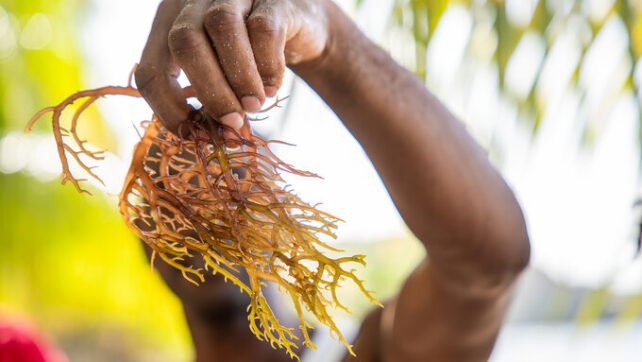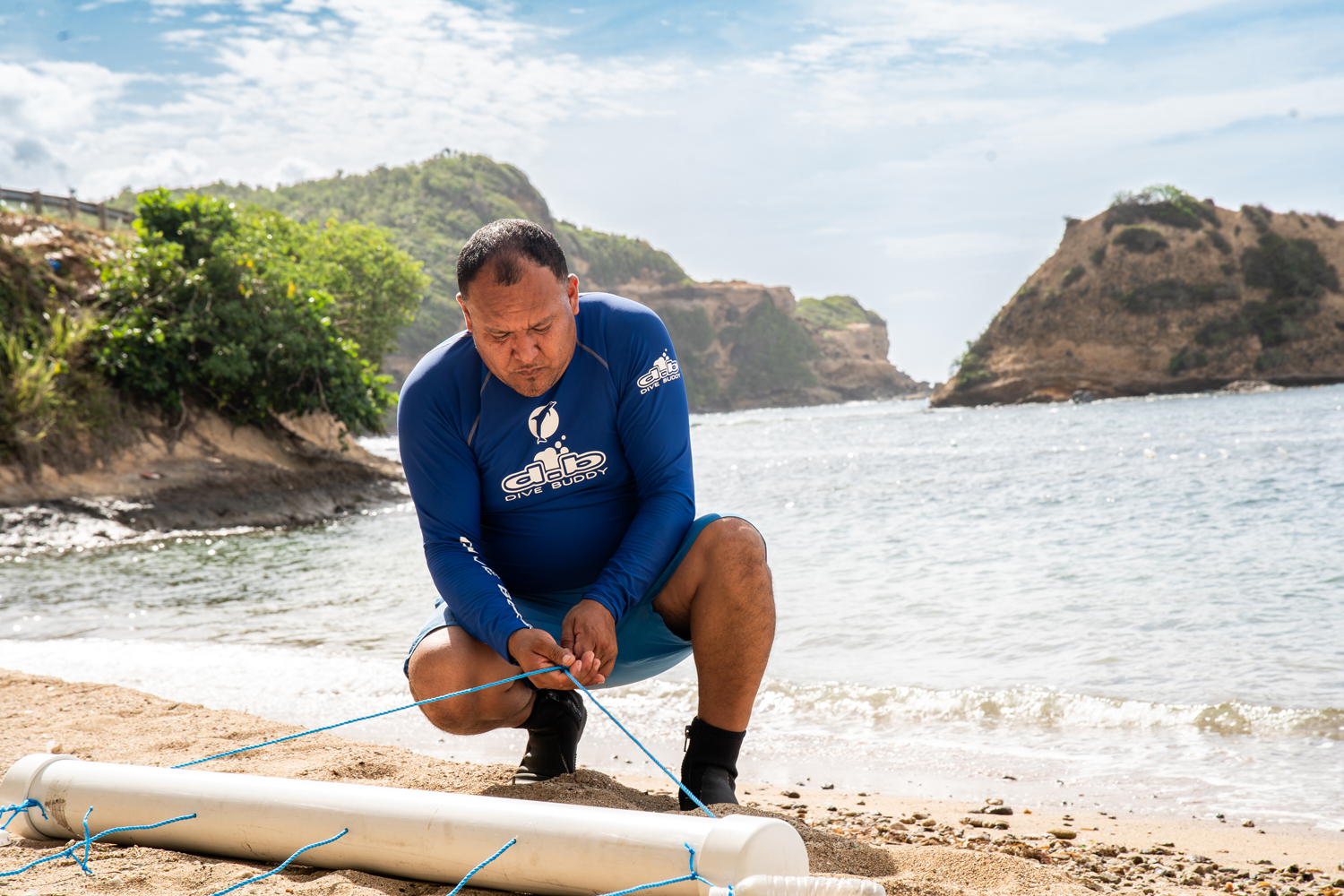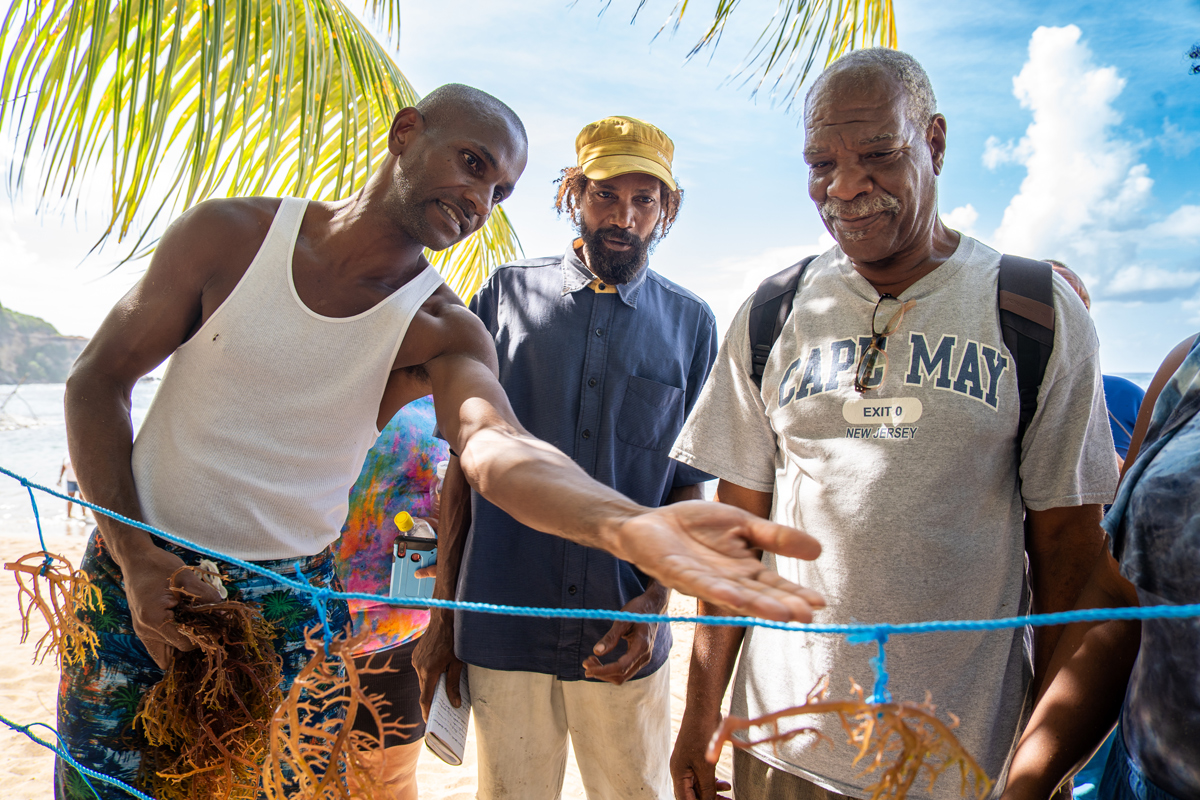
In a small island nation on the eastern edge of the Caribbean, there is a species of wild sea moss, or red algae, called Gracilaria that Dominicans have traditionally farmed and used to make drinks, gels and other products such as textile dyes.
Gracilaria, like other sea moss varieties, has a lot of dietary and cosmetic advantages. But this slow-growing variety has caused production and supply challenges for its farmers, leading to a reliance on imports of other varieties from neighbouring islands to meet local demand.
Farming sea moss is an intricate process that involves harvesting the algae, cleaning off foreign weeds and debris, bleaching and drying the harvested algae in the sunlight, before packaging the dried raw material for sale.
Unfortunately, the Gracilaria species easily attracts foreign weeds, like epiphytes. While other species of algae are self-cleaning, cleaning Gracilaria is tedious and labour-intensive. Moreover, yields from the Gracilaria species are relatively low at an average ratio of 18 kilograms wet to 1 kilogram dry and that means lower profits.

“Many of the farmers were growing sea moss on their own. They faced a lot of challenges growing Gracilaria, and the returns were not always as good. They would get discouraged, and some stopped farming sea moss,” says Dorian Sanford, a government Fisheries Officer for aquaculture and mariculture.
Despite these difficulties, many farmers refused to give up on sea moss.
A solution to the problem came in the form of Eucheuma cottonii, a commercial sea moss species first introduced to the region many decades ago. This species was offered up as part of a Food and Agriculture Organization of the United Nations (FAO) project focused on strengthening livelihoods, supporting sustainable development and building resilient agrifood value chains.
The FAO project provided classroom and field training in Eucheuma cottonnii production and good aquacultural practices. Led by Thomas Nelson, a sea moss expert from the island of Saint Lucia, the training reached technicians, extension officers and farmers from three sea moss cooperatives.
Eucheuma cottonii is a fast-growing and self-cleaning species that produces the quantity and quality of sea moss needed for profitable production. It has seen great success in Saint Lucia and other neighbouring islands that farm sea moss commercially.

Since three major farming groups in the communities of Woodford Hill, Calibishie and Grand Bay started working with Eucheuma cottonii, there have been significant improvements in sea moss production and yields.
“Since FAO came on board, we engaged the farmers’ groups about experimenting with this sea moss species. At first some of them struggled with it, but after a few months, the groups got excited about the new yields and about planting and harvesting sea moss. We started having groups harvesting anywhere between 180 kilograms and 325 kilograms of sea moss,” says Sanford, who himself received FAO training and guides farmers in the commercial production of sea moss on the island.
Optimism about the future of sea moss farming has increased since the introduction of Eucheuma cottonii.
Two of Dominica’s major agroprocessors are buying the raw product from local farmers. The farmers’ group in Grand Bay is exporting sea moss in small quantities to the United States of America and in Woodford Hill, they are exploring converting sea moss into cosmetic products.
To continue guiding farmers and developing the industry, Dominica’s Ministry of Agriculture, Fisheries, Blue and Green Economy is supporting the farmers with the introduction of drying sheds and have also developed a nursery for the Eucheuma cottonii species to help new and existing sea moss farmers. The nursery allows the farmers to rebound more quickly from damage and sea moss losses caused by storms, like Tropical Storm Bret in June 2023. Through the nursery, they received 18 kilograms of sea moss to restock their farms.
Despite occasional difficulties caused by extreme weather, sea moss remains high on the country’s aquaculture agenda due to its high-income earning potential. It is creating jobs and a better quality of life for Dominican farmers and communities.
“Dominica will soon be on the map for growing sea moss,” Sanford says.
Strengthening production is just the first step in building up the value chain. In the long run, the project aims to strengthen linkages between the private and public sectors. Creating these long-term partnerships can help boost investment in the sea moss sector and enhance the resilience and sustainability of sea moss production in Dominica.

That reminds me how we lost our lime industry, the number one in the world in the 70s in order for the conglomerates to create scarcity and drive up the price of limeacol, yes limeacol, and their other lime products on world market. Well, it worked. A few people made out big, and the objective was achieved. Today we have no limes, may have to import limes from Guadeloupe or Barbados green houses at some point. 🤔
Garçan doh listen to dem Albinos!!!
Dey juss want to come and Fork-up the special Sea Moss species we see no where else but only on Dominica,,,
Dem Farmers juss lazy!!! So what allyou have to clean the thing a little more put it on the price nuh!!!
just like dem albinos introduced Lion Fish to our waters so to dey want to mess up our vibes!!!
De Little sea moss whatever nature give us we should agree to have and just practice Sustainable Sea Moss growing and don’t introduce no foreign species to our pure Brand!!!
Dey take Coconut Products from us
Dey Take bananas from us
Dey take Bello from us
Dey tiffing even our geothermal energy and it doh even establish yet
What little we have dat is truly Dominican let it stay like dat nuh please!!!
Allyou should say thanks but NO thanks to Freeniss!!!
FreeNiss is Worryniss!!!
I’m glad you paying attention, Rastar. Many of Our people will sell what we have to make a likkle personal pie-in-the-sky💰 money. Not good in the long run.
All the prodigal sons who are talking patriotism should do something for Dominica.Those people spent all their young days living and working lands,they never did sxxx for the country,not even a Kai poul.Now they are retired,they want to run Dominica on remote control.Retire and stay where you are.